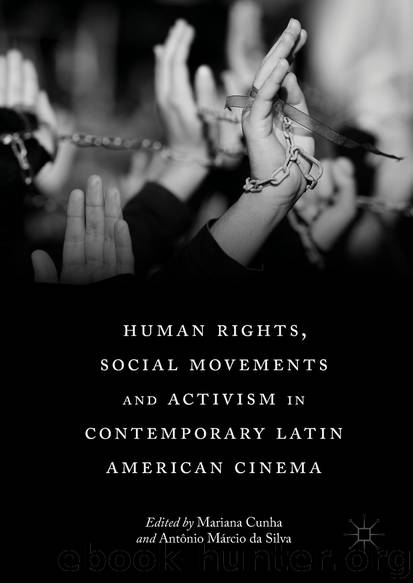Human Rights, Social Movements and Activism in Contemporary Latin American Cinema by Mariana Cunha & Antônio Márcio da Silva

Author:Mariana Cunha & Antônio Márcio da Silva
Language: eng
Format: epub
ISBN: 9783319962085
Publisher: Springer International Publishing
Conclusion
The significance of Martírio in Brazilian film history is yet to be fully recognized. 19 In this brief consideration, the chapter examined the ways in which conflicting conceptions of land and territory were mediated, as well as the role of the historical approach of the film for the construction of a disputed spatial knowledge. Indeed, Martírio is constructed through a thorough research of images and documents that takes the spectator back to the first registers of the Guarani-Kaiowá, with the purpose of recounting a history of Brazil from a different perspective. It is through a historical prism that displacements and evictions characterize this disputed geography .
Throughout the film the spectator is witness to “a contemporary genocide ” (Carelli 2016, n.p.), which is narrated through a clash between different visions of territoriality where land ownership is perversely placed above indigenous rights to nature and to their life-worlds. The Guarani-Kaiowá’s tireless repossession attempts, which are edited in the film complemented by their chanting and prayers, come into conflict with Internet footage of discussions in the House of Representatives, Senate committees, agribusiness meetings, whose long insertions in the film reveal the absolute disrespect for indigenous territorial vision and rights. These testimonials from politicians and landowners are a response to what Hierro and Surrallés have previously enquired: “Are national societies sufficiently mature to respect the day-to-day implementation of the different territorial concepts of each of the peoples that form an integral part of them?” (2005, 9). Martírio evidences quite the opposite: The State’s interest in progress at all cost and its role in the rampant growth of agribusiness are part of the same force that aggressively strips of the fundamental constitutional and basic human rights (land, identity and religious practices, health and dignity) of the Guarani-Kaiowá groups. In his review of Martírio, Eduardo Escorel (2016) reflects on the longstanding historical injustice reflected in Carelli’s voice-off narration: “It is in the treatment of the indigenous people that Brazilian society reveals itself. Will the Brazilian State have the courage to take responsibility for this perpetuating tragedy? Or will we have to face even more somber times?” It seems that indeed it will. 20
Download
This site does not store any files on its server. We only index and link to content provided by other sites. Please contact the content providers to delete copyright contents if any and email us, we'll remove relevant links or contents immediately.
Call Me by Your Name by André Aciman(20521)
Ready Player One by Cline Ernest(14679)
How to Be a Bawse: A Guide to Conquering Life by Lilly Singh(7489)
Wiseguy by Nicholas Pileggi(5791)
The Kite Runner by Khaled Hosseini(5183)
On Writing A Memoir of the Craft by Stephen King(4947)
Audition by Ryu Murakami(4933)
The Crown by Robert Lacey(4818)
Call me by your name by Andre Aciman(4691)
Gerald's Game by Stephen King(4656)
Harry Potter and the Cursed Child: The Journey by Harry Potter Theatrical Productions(4507)
Dialogue by Robert McKee(4406)
The Perils of Being Moderately Famous by Soha Ali Khan(4221)
Dynamic Alignment Through Imagery by Eric Franklin(4217)
Apollo 8 by Jeffrey Kluger(3713)
The Inner Game of Tennis by W. Timothy Gallwey(3688)
Seriously... I'm Kidding by Ellen DeGeneres(3637)
How to be Champion: My Autobiography by Sarah Millican(3594)
Darker by E L James(3520)
